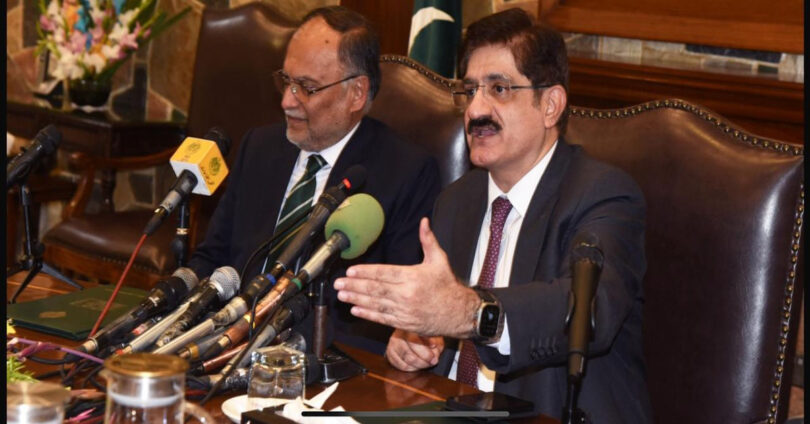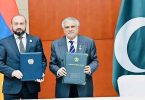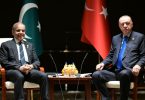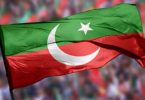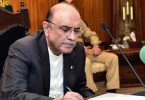F.P. Report
KARACHI: Sindh Chief Minister Murad Ali Shah has emphasised the need for unity, strategic economic planning, and infrastructural development to achieve Pakistan’s vision of a trillion-dollar economy.
This he said while speaking at the “Uraan Pakistan” workshop, hosted by the Sindh government at CM House on Monday.. He outlined the challenges and opportunities for sustainable growth. The programme was attended by Federal Minister of Planning, Development & Special Initiatives (MoPDSI) Ahsan Iqbal, Senior Minister Sharjeel Memon, P&D Minister Nasir Shah, CM Special Assistant Syed Qasim Naveed, Chief Secretary Asif Hyder Shah, Chairman P&D Najam Shah and provincial and federal secretaries.
CM Murad Shah emphasised the decline in exports, stating that energy and infrastructure development are crucial for economic progress. “We cannot increase exports without reliable energy and modern infrastructure,” he remarked. He pointed out that ports are underutilised due to logistics constraints and suggested that heavy traffic should be redirected to the Lyari Expressway to facilitate smoother goods transportation.
Infrastructure & Economic Development: CM Shah announced that Shahrah-e-Bhutto will be completed by the end of this year, providing an alternative route for heavy traffic. He also stressed the need for a Ring Road to enhance transport and stimulate economic activity and highlighted the potential of the Dhabeji and Khairpur economic zones, urging stakeholders to support export-oriented industries.
Mura Shah said that Thar Coal remains underutilised, and despite the Jhimpir Corridor’s capacity of 50,000 MW, Pakistan is only producing 2,000 MW. He called for increased investment in renewable energy to reduce reliance on imported fuels.
Digital & Technological Growth: Talking about digital and technology growth, the chief minister asserted that Pakistan’s youth possess immense talent, but the lack of high-speed internet and digital infrastructure is hindering their ability to compete globally. He acknowledged Chairman Bilawal Bhutto Zardari’s concerns regarding digital connectivity and called for greater investment in the IT sector.
Population Growth: Murad Ali Shah, talking about population growth, identified population [growth] as Pakistan’s biggest challenge, stating that if the country had followed regional trends, its population would be around 130 million rather than its current levels. He noted that neighbouring countries have effectively controlled population growth, whereas Pakistan has failed to implement similar strategies.
Climate Change: Discussing climate change, Mr Shah reminded that Benazir Bhutto’s 2008 manifesto included climate action, which has gained significant importance following recent floods. He announced that the Sindh government is heavily investing in water conservation projects but called for federal support in large-scale water infrastructure initiatives.
Murad Shah reiterated the need for unity and collective action to lead Pakistan toward a prosperous future. “We must leave a country for our next generation where they can truly soar,” he stated.
Press Conference: Sindh CM Murad Ali Shah & Federal Minister Ahsan Iqbal, addressing a Joint Press Conference, highlighted Sindh’s vulnerability to climate disasters, stating that the province suffered the worst impact of the 2022 floods. They stressed the urgent need for climate resilience, noting that coastal areas of Sindh are being eroded by rising sea levels. “To counter this crisis, we must implement Green Revolution 2.0,” Murad Shah and Ahsan Iqbal said.
Energy & Infrastructure Development: Referring to Pakistan’s energy future, Ahsan Iqbal pointed out that Sindh has a 400-year coal reserve, which, in collaboration with the Sindh government, is being utilised to make the province an energy hub. He also announced that the Sukkur-Hyderabad Motorway project will begin this year, along with the reconstruction of the Karachi-Hyderabad Motorway, making it more efficient for port connectivity.
Ahsan Iqbal expressed concern over Pakistan’s rising population growth rate of 2.55 per cent, warning that if left unchecked, it could collapse the economy. He emphasised that developed nations, both Muslim and non-Muslim, have controlled their populations to achieve economic progress.
Referring to Pakistan’s economic history, Ahsan Iqbal said, “In 77 years, we have crashed three economic take-offs. Now, we are in our fourth attempt, and we are seeing progress.” He highlighted improvements in exports, energy, inflation control, and stock market indicators but stressed that Pakistan’s key to success lies in political stability. “Right now, we don’t need a political long march-we need an economic long march,” he stated. He also praised the Sindh government for its full cooperation in national development projects and invited the private sector and civil society to join efforts for economic growth.
Murad talks about water crisis: Sindh CM Murad Shah addressed concerns about water shortages in Sindh, clarifying that despite reports of the Chulistan Canal’s approval, there is no water available in the system to support new canals. He reassured that the Sindh government will fight for its water rights through legal and constitutional means rather than protests. “We do not need to take to the streets; we can prove our case with facts and figures,” the CM said, adding that the telemetry system will ultimately reveal the true water distribution data.
Social Media Regulations: To a question, Ahsan Iqbal reaffirmed the government’s commitment to media freedom but warned against misusing social media for harassment and hate speech. “Freedom of expression does not mean harassing mothers and sisters online. Even in the UK, defamation can lead to a £50,000 fine within a month,” he said, recalling his own experience as a victim of violence with a bullet still lodged in his body.
Ahsan Iqbal acknowledged past injustices against Sindh during the PTI government and appreciated CM Murad Ali Shah’s data-driven approach in advocating for Sindh’s rights. “On Sindh CMs request, we have included several Sindh projects in the Public Sector Development Program (PSDP),” he said.
Federal Minister Ahsan Iqbal stated that in every coalition government, differences arise, but they are also resolved. He assured that the alliance between the Pakistan Muslim League-Nawaz (PML-N) and Pakistan Peoples Party (PPP) is stable, as both parties have a mechanism to address concerns.
“There is no threat to the government’s coalition,” he emphasised, adding that a committee led by Deputy Prime Minister Ishaq Dar is actively maintaining communication between both parties. He also confirmed that Prime Minister Shehbaz Sharif will soon convene the Council of Common Interests (CCI) meeting. Ahsan Iqbal reassured that all provinces will receive their fair share of resources and that no province will be deprived of its rights by another. “Pakistan’s Situation Changed After May 9” He recalled that before May 9, no attacks on defence institutions had ever occurred.
He accused former President Arif Alvi of harming Pakistan’s global image, saying “Arif Alvi is spreading propaganda, claiming that the situation in Pakistan is worse than in Kashmir and Gaza.” He further alleged that writing letters to the IMF against Pakistan is a form of economic terrorism. “PTI is Running a Bigger Anti-Pakistan Campaign Than RAW”
Ahsan Iqbal criticized Pakistan Tehreek-e-Insaf (PTI), stating that despite holding numerous rallies before May 9, the government never created any obstacles. However, he claimed that PTI is now running a campaign against Pakistan that is more damaging than that of RAW (India’s intelligence agency). Referring to financial corruption, Ahsan Iqbal said that money recovered in London was meant to be returned to the people of Pakistan, but instead, PTI returned it to the original thief. “Today, the entire PTI is defending that criminal,” he remarked, adding that PTI executed the world’s most transparent theft, leaving behind a complete money trail. He concluded by accusing PTI of stealing £190 million from the public and then playing the victim, stating, “They give stolen public money back to the thief and then claim political persecution.”

